A Literature Review: Effects of Nurse Shift-Work on Physical Health
VerifiedAdded on 2022/10/02
|7
|1622
|318
Literature Review
AI Summary
This literature review examines the impact of nurse shift-work on the physical health of nurses, focusing on the effects of sleep deprivation and disrupted sleep patterns. The review synthesizes findings from multiple studies, highlighting the adverse effects of shift work on nurses' well-being. Key themes include the relationship between sleep loss and diminished quality of care, increased stress and anxiety, and the development of physical ailments such as back pain, headaches, and gastritis. Several studies emphasize the importance of implementing strategies to improve nurses' sleep hygiene and overall health, such as time management techniques, scheduled napping, and supportive organizational policies. The review also points to the need for education and training programs to help nurses manage stress and maintain healthy sleep routines in the face of demanding work schedules, ultimately promoting a more positive and empathic work environment.
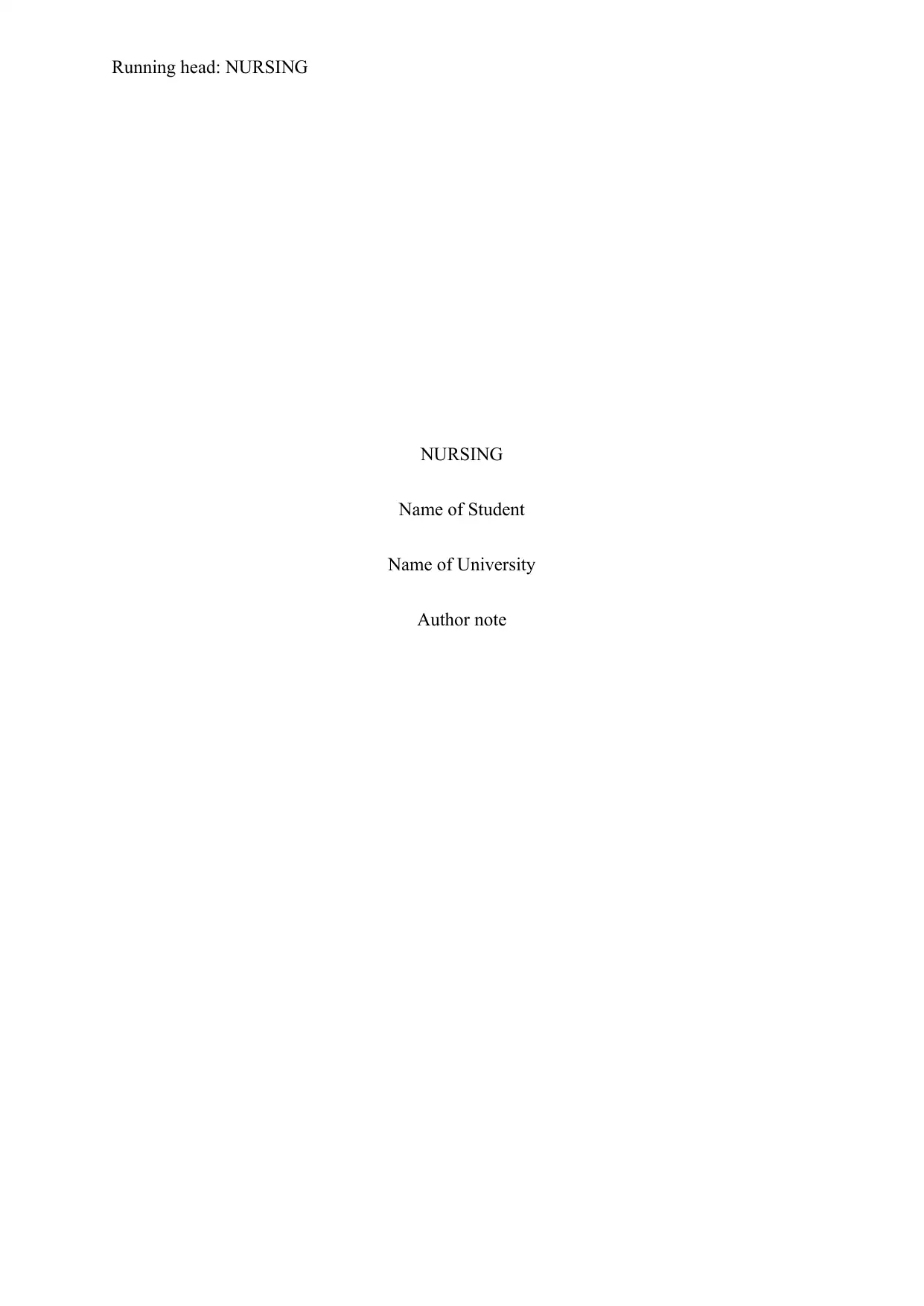
Running head: NURSING
NURSING
Name of Student
Name of University
Author note
NURSING
Name of Student
Name of University
Author note
Paraphrase This Document
Need a fresh take? Get an instant paraphrase of this document with our AI Paraphraser
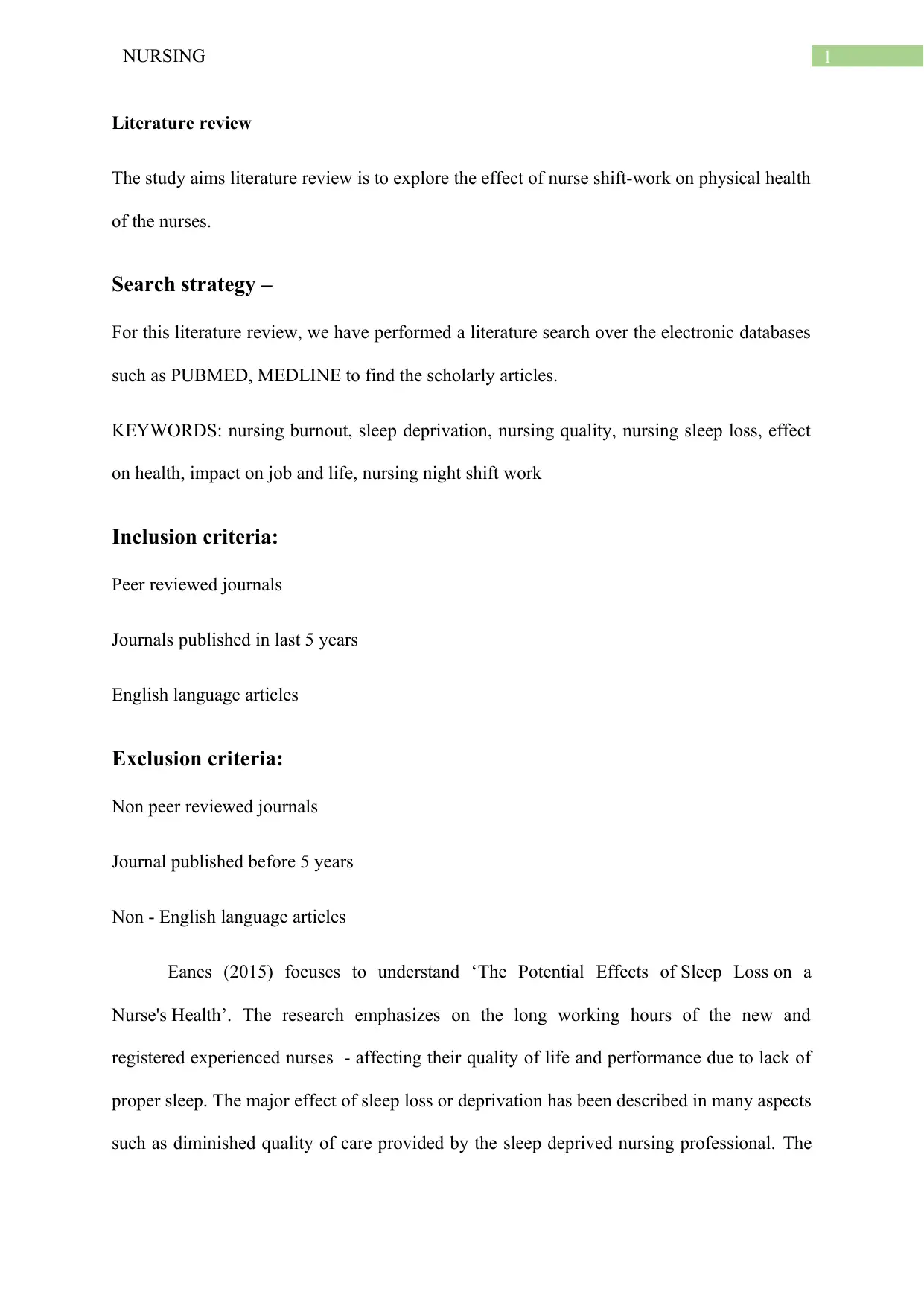
1NURSING
Literature review
The study aims literature review is to explore the effect of nurse shift-work on physical health
of the nurses.
Search strategy –
For this literature review, we have performed a literature search over the electronic databases
such as PUBMED, MEDLINE to find the scholarly articles.
KEYWORDS: nursing burnout, sleep deprivation, nursing quality, nursing sleep loss, effect
on health, impact on job and life, nursing night shift work
Inclusion criteria:
Peer reviewed journals
Journals published in last 5 years
English language articles
Exclusion criteria:
Non peer reviewed journals
Journal published before 5 years
Non - English language articles
Eanes (2015) focuses to understand ‘The Potential Effects of Sleep Loss on a
Nurse's Health’. The research emphasizes on the long working hours of the new and
registered experienced nurses - affecting their quality of life and performance due to lack of
proper sleep. The major effect of sleep loss or deprivation has been described in many aspects
such as diminished quality of care provided by the sleep deprived nursing professional. The
Literature review
The study aims literature review is to explore the effect of nurse shift-work on physical health
of the nurses.
Search strategy –
For this literature review, we have performed a literature search over the electronic databases
such as PUBMED, MEDLINE to find the scholarly articles.
KEYWORDS: nursing burnout, sleep deprivation, nursing quality, nursing sleep loss, effect
on health, impact on job and life, nursing night shift work
Inclusion criteria:
Peer reviewed journals
Journals published in last 5 years
English language articles
Exclusion criteria:
Non peer reviewed journals
Journal published before 5 years
Non - English language articles
Eanes (2015) focuses to understand ‘The Potential Effects of Sleep Loss on a
Nurse's Health’. The research emphasizes on the long working hours of the new and
registered experienced nurses - affecting their quality of life and performance due to lack of
proper sleep. The major effect of sleep loss or deprivation has been described in many aspects
such as diminished quality of care provided by the sleep deprived nursing professional. The
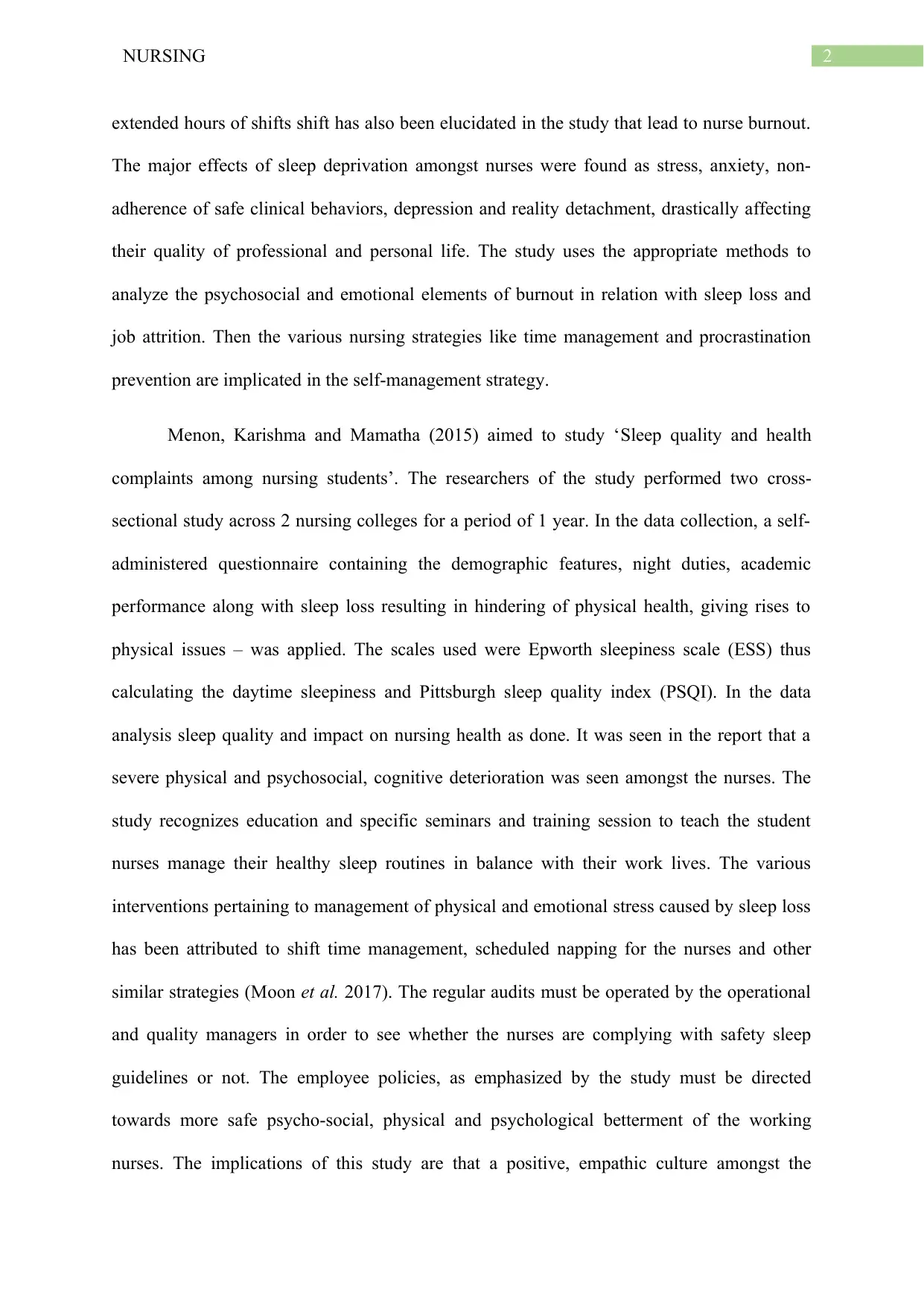
2NURSING
extended hours of shifts shift has also been elucidated in the study that lead to nurse burnout.
The major effects of sleep deprivation amongst nurses were found as stress, anxiety, non-
adherence of safe clinical behaviors, depression and reality detachment, drastically affecting
their quality of professional and personal life. The study uses the appropriate methods to
analyze the psychosocial and emotional elements of burnout in relation with sleep loss and
job attrition. Then the various nursing strategies like time management and procrastination
prevention are implicated in the self-management strategy.
Menon, Karishma and Mamatha (2015) aimed to study ‘Sleep quality and health
complaints among nursing students’. The researchers of the study performed two cross-
sectional study across 2 nursing colleges for a period of 1 year. In the data collection, a self-
administered questionnaire containing the demographic features, night duties, academic
performance along with sleep loss resulting in hindering of physical health, giving rises to
physical issues – was applied. The scales used were Epworth sleepiness scale (ESS) thus
calculating the daytime sleepiness and Pittsburgh sleep quality index (PSQI). In the data
analysis sleep quality and impact on nursing health as done. It was seen in the report that a
severe physical and psychosocial, cognitive deterioration was seen amongst the nurses. The
study recognizes education and specific seminars and training session to teach the student
nurses manage their healthy sleep routines in balance with their work lives. The various
interventions pertaining to management of physical and emotional stress caused by sleep loss
has been attributed to shift time management, scheduled napping for the nurses and other
similar strategies (Moon et al. 2017). The regular audits must be operated by the operational
and quality managers in order to see whether the nurses are complying with safety sleep
guidelines or not. The employee policies, as emphasized by the study must be directed
towards more safe psycho-social, physical and psychological betterment of the working
nurses. The implications of this study are that a positive, empathic culture amongst the
extended hours of shifts shift has also been elucidated in the study that lead to nurse burnout.
The major effects of sleep deprivation amongst nurses were found as stress, anxiety, non-
adherence of safe clinical behaviors, depression and reality detachment, drastically affecting
their quality of professional and personal life. The study uses the appropriate methods to
analyze the psychosocial and emotional elements of burnout in relation with sleep loss and
job attrition. Then the various nursing strategies like time management and procrastination
prevention are implicated in the self-management strategy.
Menon, Karishma and Mamatha (2015) aimed to study ‘Sleep quality and health
complaints among nursing students’. The researchers of the study performed two cross-
sectional study across 2 nursing colleges for a period of 1 year. In the data collection, a self-
administered questionnaire containing the demographic features, night duties, academic
performance along with sleep loss resulting in hindering of physical health, giving rises to
physical issues – was applied. The scales used were Epworth sleepiness scale (ESS) thus
calculating the daytime sleepiness and Pittsburgh sleep quality index (PSQI). In the data
analysis sleep quality and impact on nursing health as done. It was seen in the report that a
severe physical and psychosocial, cognitive deterioration was seen amongst the nurses. The
study recognizes education and specific seminars and training session to teach the student
nurses manage their healthy sleep routines in balance with their work lives. The various
interventions pertaining to management of physical and emotional stress caused by sleep loss
has been attributed to shift time management, scheduled napping for the nurses and other
similar strategies (Moon et al. 2017). The regular audits must be operated by the operational
and quality managers in order to see whether the nurses are complying with safety sleep
guidelines or not. The employee policies, as emphasized by the study must be directed
towards more safe psycho-social, physical and psychological betterment of the working
nurses. The implications of this study are that a positive, empathic culture amongst the
⊘ This is a preview!⊘
Do you want full access?
Subscribe today to unlock all pages.

Trusted by 1+ million students worldwide
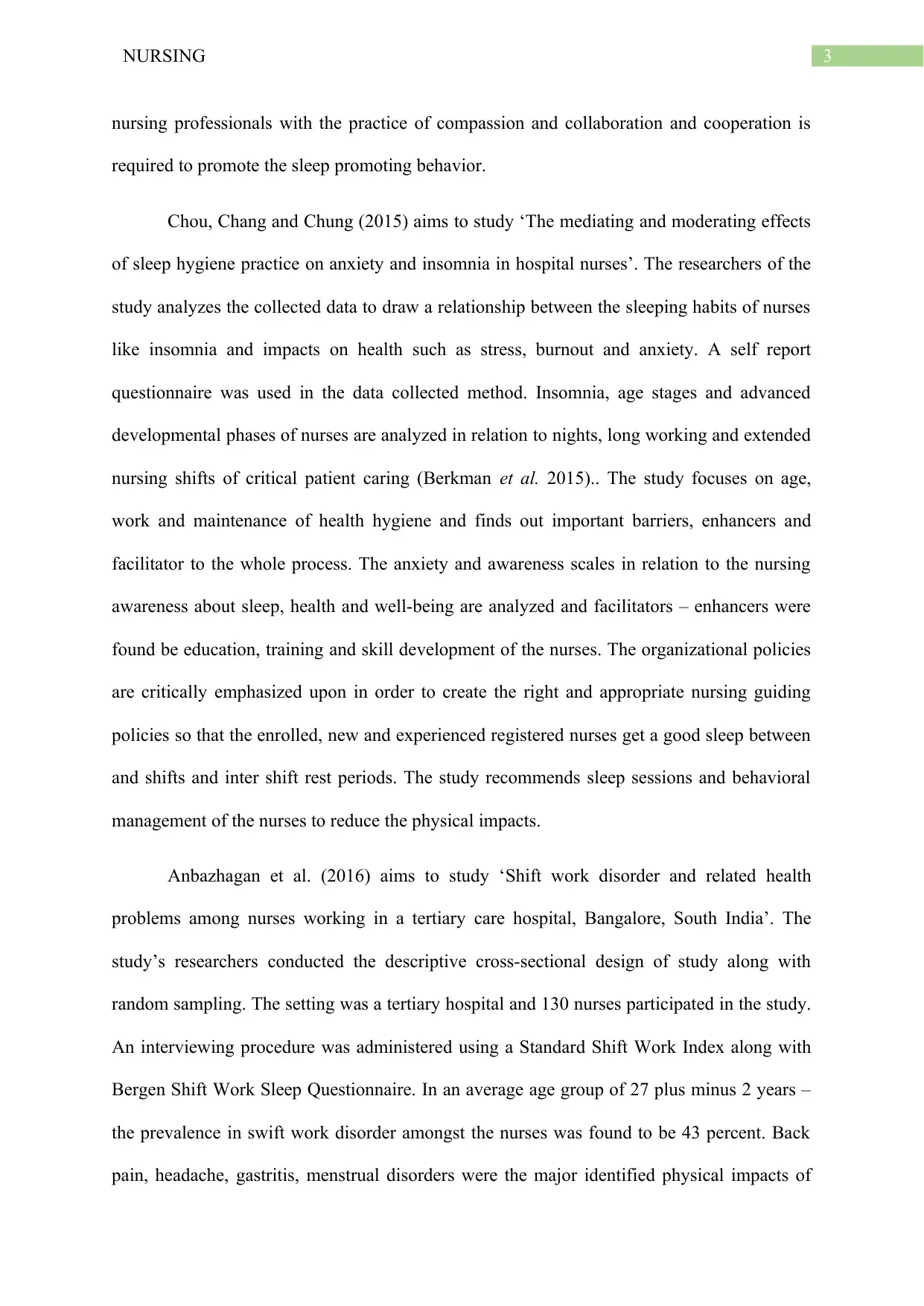
3NURSING
nursing professionals with the practice of compassion and collaboration and cooperation is
required to promote the sleep promoting behavior.
Chou, Chang and Chung (2015) aims to study ‘The mediating and moderating effects
of sleep hygiene practice on anxiety and insomnia in hospital nurses’. The researchers of the
study analyzes the collected data to draw a relationship between the sleeping habits of nurses
like insomnia and impacts on health such as stress, burnout and anxiety. A self report
questionnaire was used in the data collected method. Insomnia, age stages and advanced
developmental phases of nurses are analyzed in relation to nights, long working and extended
nursing shifts of critical patient caring (Berkman et al. 2015).. The study focuses on age,
work and maintenance of health hygiene and finds out important barriers, enhancers and
facilitator to the whole process. The anxiety and awareness scales in relation to the nursing
awareness about sleep, health and well-being are analyzed and facilitators – enhancers were
found be education, training and skill development of the nurses. The organizational policies
are critically emphasized upon in order to create the right and appropriate nursing guiding
policies so that the enrolled, new and experienced registered nurses get a good sleep between
and shifts and inter shift rest periods. The study recommends sleep sessions and behavioral
management of the nurses to reduce the physical impacts.
Anbazhagan et al. (2016) aims to study ‘Shift work disorder and related health
problems among nurses working in a tertiary care hospital, Bangalore, South India’. The
study’s researchers conducted the descriptive cross-sectional design of study along with
random sampling. The setting was a tertiary hospital and 130 nurses participated in the study.
An interviewing procedure was administered using a Standard Shift Work Index along with
Bergen Shift Work Sleep Questionnaire. In an average age group of 27 plus minus 2 years –
the prevalence in swift work disorder amongst the nurses was found to be 43 percent. Back
pain, headache, gastritis, menstrual disorders were the major identified physical impacts of
nursing professionals with the practice of compassion and collaboration and cooperation is
required to promote the sleep promoting behavior.
Chou, Chang and Chung (2015) aims to study ‘The mediating and moderating effects
of sleep hygiene practice on anxiety and insomnia in hospital nurses’. The researchers of the
study analyzes the collected data to draw a relationship between the sleeping habits of nurses
like insomnia and impacts on health such as stress, burnout and anxiety. A self report
questionnaire was used in the data collected method. Insomnia, age stages and advanced
developmental phases of nurses are analyzed in relation to nights, long working and extended
nursing shifts of critical patient caring (Berkman et al. 2015).. The study focuses on age,
work and maintenance of health hygiene and finds out important barriers, enhancers and
facilitator to the whole process. The anxiety and awareness scales in relation to the nursing
awareness about sleep, health and well-being are analyzed and facilitators – enhancers were
found be education, training and skill development of the nurses. The organizational policies
are critically emphasized upon in order to create the right and appropriate nursing guiding
policies so that the enrolled, new and experienced registered nurses get a good sleep between
and shifts and inter shift rest periods. The study recommends sleep sessions and behavioral
management of the nurses to reduce the physical impacts.
Anbazhagan et al. (2016) aims to study ‘Shift work disorder and related health
problems among nurses working in a tertiary care hospital, Bangalore, South India’. The
study’s researchers conducted the descriptive cross-sectional design of study along with
random sampling. The setting was a tertiary hospital and 130 nurses participated in the study.
An interviewing procedure was administered using a Standard Shift Work Index along with
Bergen Shift Work Sleep Questionnaire. In an average age group of 27 plus minus 2 years –
the prevalence in swift work disorder amongst the nurses was found to be 43 percent. Back
pain, headache, gastritis, menstrual disorders were the major identified physical impacts of
Paraphrase This Document
Need a fresh take? Get an instant paraphrase of this document with our AI Paraphraser
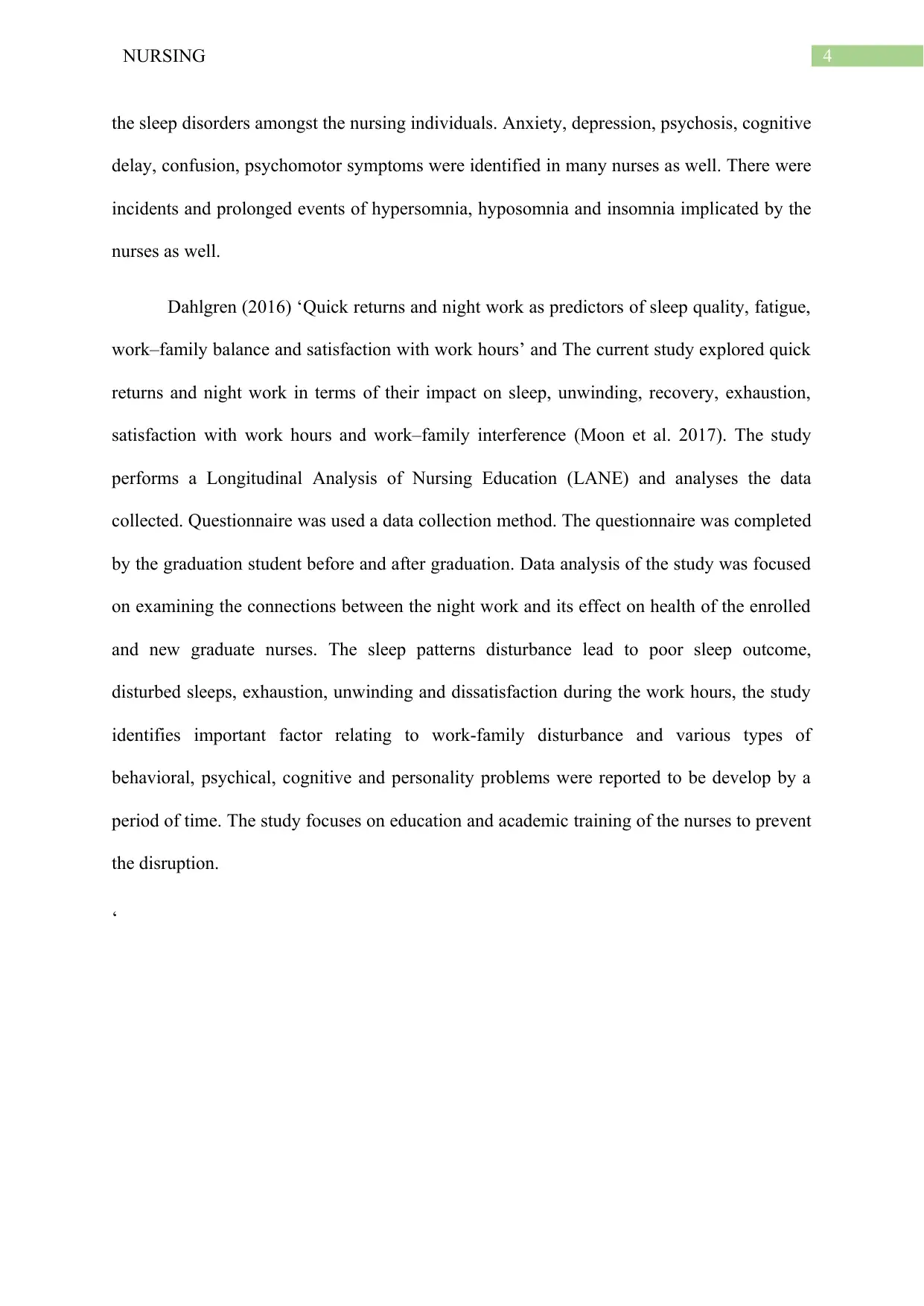
4NURSING
the sleep disorders amongst the nursing individuals. Anxiety, depression, psychosis, cognitive
delay, confusion, psychomotor symptoms were identified in many nurses as well. There were
incidents and prolonged events of hypersomnia, hyposomnia and insomnia implicated by the
nurses as well.
Dahlgren (2016) ‘Quick returns and night work as predictors of sleep quality, fatigue,
work–family balance and satisfaction with work hours’ and The current study explored quick
returns and night work in terms of their impact on sleep, unwinding, recovery, exhaustion,
satisfaction with work hours and work–family interference (Moon et al. 2017). The study
performs a Longitudinal Analysis of Nursing Education (LANE) and analyses the data
collected. Questionnaire was used a data collection method. The questionnaire was completed
by the graduation student before and after graduation. Data analysis of the study was focused
on examining the connections between the night work and its effect on health of the enrolled
and new graduate nurses. The sleep patterns disturbance lead to poor sleep outcome,
disturbed sleeps, exhaustion, unwinding and dissatisfaction during the work hours, the study
identifies important factor relating to work-family disturbance and various types of
behavioral, psychical, cognitive and personality problems were reported to be develop by a
period of time. The study focuses on education and academic training of the nurses to prevent
the disruption.
‘
the sleep disorders amongst the nursing individuals. Anxiety, depression, psychosis, cognitive
delay, confusion, psychomotor symptoms were identified in many nurses as well. There were
incidents and prolonged events of hypersomnia, hyposomnia and insomnia implicated by the
nurses as well.
Dahlgren (2016) ‘Quick returns and night work as predictors of sleep quality, fatigue,
work–family balance and satisfaction with work hours’ and The current study explored quick
returns and night work in terms of their impact on sleep, unwinding, recovery, exhaustion,
satisfaction with work hours and work–family interference (Moon et al. 2017). The study
performs a Longitudinal Analysis of Nursing Education (LANE) and analyses the data
collected. Questionnaire was used a data collection method. The questionnaire was completed
by the graduation student before and after graduation. Data analysis of the study was focused
on examining the connections between the night work and its effect on health of the enrolled
and new graduate nurses. The sleep patterns disturbance lead to poor sleep outcome,
disturbed sleeps, exhaustion, unwinding and dissatisfaction during the work hours, the study
identifies important factor relating to work-family disturbance and various types of
behavioral, psychical, cognitive and personality problems were reported to be develop by a
period of time. The study focuses on education and academic training of the nurses to prevent
the disruption.
‘
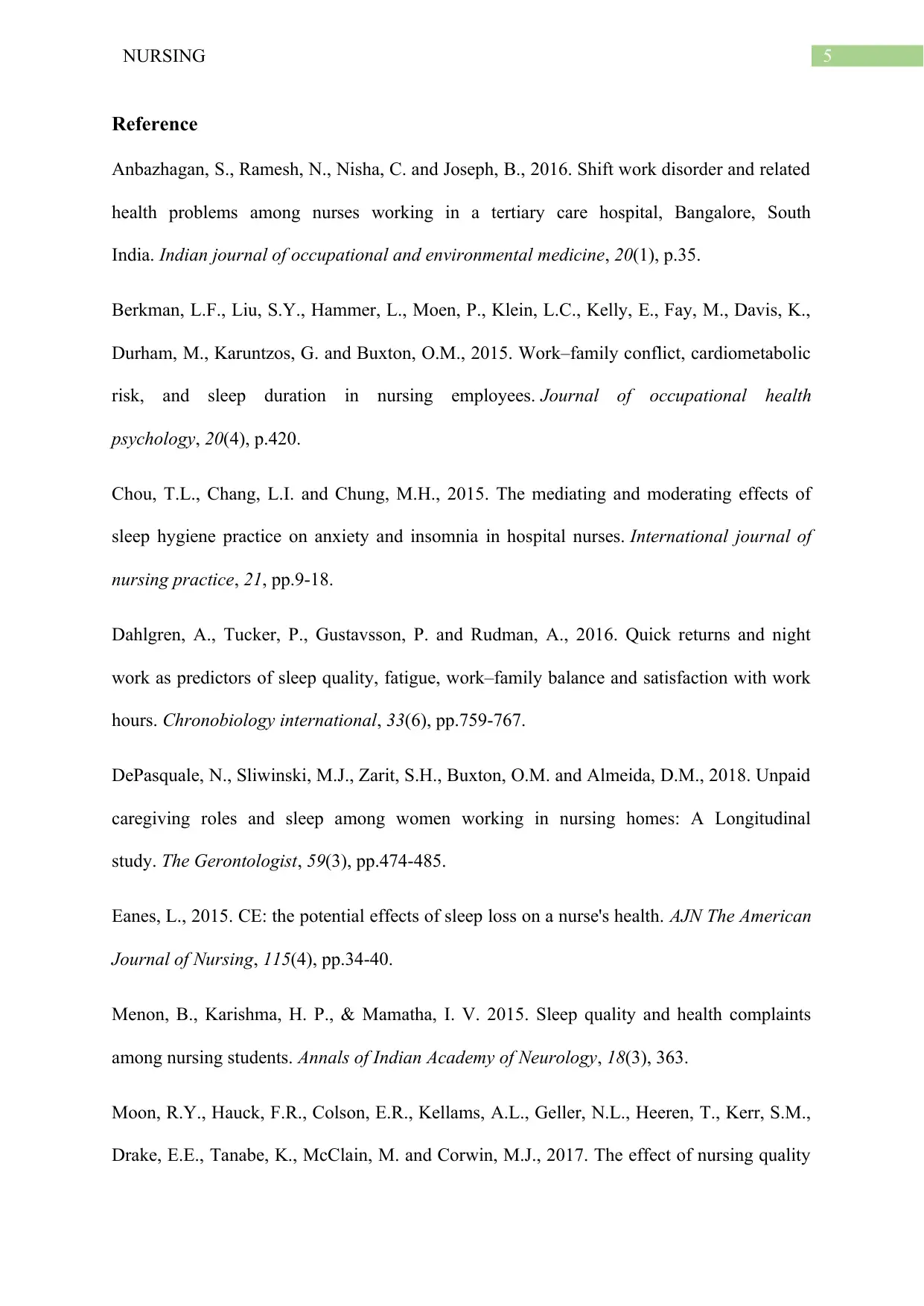
5NURSING
Reference
Anbazhagan, S., Ramesh, N., Nisha, C. and Joseph, B., 2016. Shift work disorder and related
health problems among nurses working in a tertiary care hospital, Bangalore, South
India. Indian journal of occupational and environmental medicine, 20(1), p.35.
Berkman, L.F., Liu, S.Y., Hammer, L., Moen, P., Klein, L.C., Kelly, E., Fay, M., Davis, K.,
Durham, M., Karuntzos, G. and Buxton, O.M., 2015. Work–family conflict, cardiometabolic
risk, and sleep duration in nursing employees. Journal of occupational health
psychology, 20(4), p.420.
Chou, T.L., Chang, L.I. and Chung, M.H., 2015. The mediating and moderating effects of
sleep hygiene practice on anxiety and insomnia in hospital nurses. International journal of
nursing practice, 21, pp.9-18.
Dahlgren, A., Tucker, P., Gustavsson, P. and Rudman, A., 2016. Quick returns and night
work as predictors of sleep quality, fatigue, work–family balance and satisfaction with work
hours. Chronobiology international, 33(6), pp.759-767.
DePasquale, N., Sliwinski, M.J., Zarit, S.H., Buxton, O.M. and Almeida, D.M., 2018. Unpaid
caregiving roles and sleep among women working in nursing homes: A Longitudinal
study. The Gerontologist, 59(3), pp.474-485.
Eanes, L., 2015. CE: the potential effects of sleep loss on a nurse's health. AJN The American
Journal of Nursing, 115(4), pp.34-40.
Menon, B., Karishma, H. P., & Mamatha, I. V. 2015. Sleep quality and health complaints
among nursing students. Annals of Indian Academy of Neurology, 18(3), 363.
Moon, R.Y., Hauck, F.R., Colson, E.R., Kellams, A.L., Geller, N.L., Heeren, T., Kerr, S.M.,
Drake, E.E., Tanabe, K., McClain, M. and Corwin, M.J., 2017. The effect of nursing quality
Reference
Anbazhagan, S., Ramesh, N., Nisha, C. and Joseph, B., 2016. Shift work disorder and related
health problems among nurses working in a tertiary care hospital, Bangalore, South
India. Indian journal of occupational and environmental medicine, 20(1), p.35.
Berkman, L.F., Liu, S.Y., Hammer, L., Moen, P., Klein, L.C., Kelly, E., Fay, M., Davis, K.,
Durham, M., Karuntzos, G. and Buxton, O.M., 2015. Work–family conflict, cardiometabolic
risk, and sleep duration in nursing employees. Journal of occupational health
psychology, 20(4), p.420.
Chou, T.L., Chang, L.I. and Chung, M.H., 2015. The mediating and moderating effects of
sleep hygiene practice on anxiety and insomnia in hospital nurses. International journal of
nursing practice, 21, pp.9-18.
Dahlgren, A., Tucker, P., Gustavsson, P. and Rudman, A., 2016. Quick returns and night
work as predictors of sleep quality, fatigue, work–family balance and satisfaction with work
hours. Chronobiology international, 33(6), pp.759-767.
DePasquale, N., Sliwinski, M.J., Zarit, S.H., Buxton, O.M. and Almeida, D.M., 2018. Unpaid
caregiving roles and sleep among women working in nursing homes: A Longitudinal
study. The Gerontologist, 59(3), pp.474-485.
Eanes, L., 2015. CE: the potential effects of sleep loss on a nurse's health. AJN The American
Journal of Nursing, 115(4), pp.34-40.
Menon, B., Karishma, H. P., & Mamatha, I. V. 2015. Sleep quality and health complaints
among nursing students. Annals of Indian Academy of Neurology, 18(3), 363.
Moon, R.Y., Hauck, F.R., Colson, E.R., Kellams, A.L., Geller, N.L., Heeren, T., Kerr, S.M.,
Drake, E.E., Tanabe, K., McClain, M. and Corwin, M.J., 2017. The effect of nursing quality
⊘ This is a preview!⊘
Do you want full access?
Subscribe today to unlock all pages.

Trusted by 1+ million students worldwide
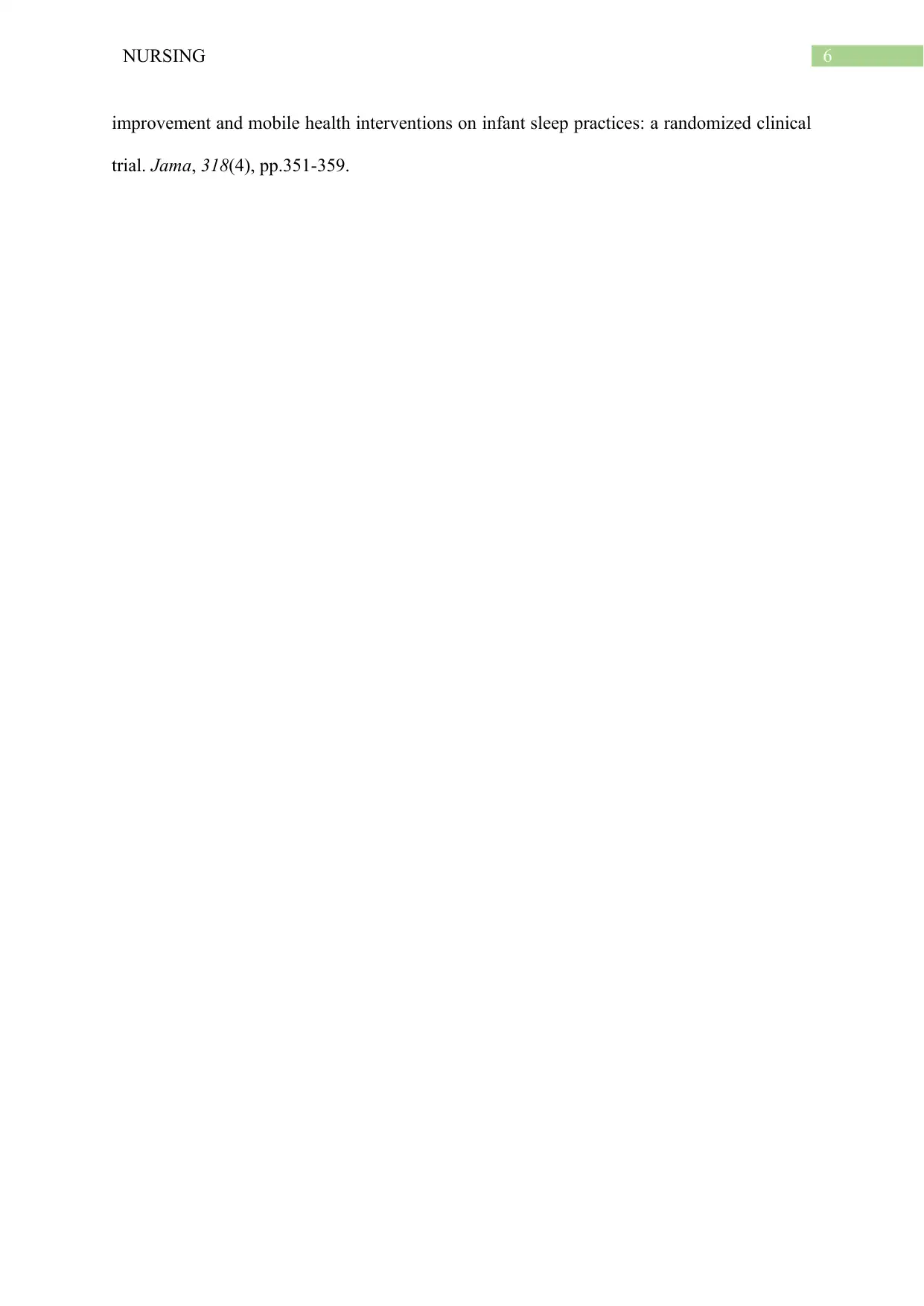
6NURSING
improvement and mobile health interventions on infant sleep practices: a randomized clinical
trial. Jama, 318(4), pp.351-359.
improvement and mobile health interventions on infant sleep practices: a randomized clinical
trial. Jama, 318(4), pp.351-359.
1 out of 7
Related Documents
Your All-in-One AI-Powered Toolkit for Academic Success.
+13062052269
info@desklib.com
Available 24*7 on WhatsApp / Email
![[object Object]](/_next/static/media/star-bottom.7253800d.svg)
Unlock your academic potential
Copyright © 2020–2026 A2Z Services. All Rights Reserved. Developed and managed by ZUCOL.





